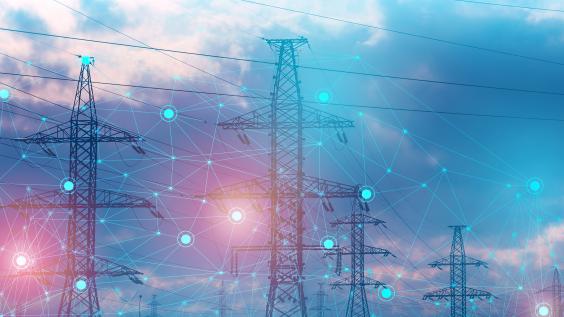AI and Energy: Advanced Tools for Knowledge Discovery

Table of Contents
Author(s)
Share this Publication
- Print This Publication
- Cite This Publication Copy Citation
Christopher Bronk, “AI and Energy: Advanced Tools for Knowledge Discovery” (Houston: Rice University’s Baker Institute for Public Policy, August 22, 2024), https://doi.org/10.25613/TQ6V-C361.
This article is also featured in Energy Insights, which reflects a sample of ongoing research across the Center for Energy Studies’ diverse programmatic areas, all addressing the ever-evolving energy challenges across Texas, the U.S., and the globe. Read more from the inaugural edition.
A New World
Benjamin Franklin is reputed to have said, “An investment in knowledge pays the best interest.”[1] Right now, a transformation in knowledge is afoot. Information arrives in an unending torrent. It is important to make better sense of this torrent by using computer-human teaming to combine multiple streams of information to see the patterns of discourse and influence on energy issues from the local to global level. In the last year, we have witnessed one of the biggest information and computing breakthroughs of at least a decade — ChatGPT and its Large Language Model (LLM) contemporaries. Despite the hype in the area, there is a need to make sense of ever-deepening pools of information on almost any topic while at the same time using artificial intelligence (AI) to create new information.
New Methods for Understanding a World Remade
To expand the analysis of energy, we must harness rapidly evolving information tools that link quantitative data with news, online media, video streams, and other computer-mediated interactions. A key goal is to better understand how information can be wielded by nation-states and other entities on topics from renewable technologies and data center operations to climate mitigation schemes and international collaborations.
Make no mistake, market data regarding energy products and services remains as important as ever for understanding the field; however, AI technologies may allow us to make better sense of the larger discourse surrounding energy and politics, from local to national to international. Whether tracking statements by world leaders, evaluating new technology investments, or debunking disinformation, utilizing the latest computational tools to better explain our complicated world will become the norm.
Energy Policy and Technology
As a series of global energy transitions progresses, new methods for understanding markets, regulation, politics, security, social movements, and technology will be critical for coping with information overload. Fortunately, monitoring of energy activity can be greatly aided by new computational technologies that read government proposals, news reporting, and other forms of information to provide unique insights. By coupling human and machine intelligence, in what has been referred to as a centaur model, can offer an innovative capacity for sensemaking and awareness.[2] In the past, we might convene experts to write a study on an emergent topic. Now, we have the capacity to have a first pass summary on almost any issue in minutes.
In the world of energy and geopolitics, it is important to monitor rapidly evolving drafts of law and other policy on a global scale. Tracking only a single piece of proposed regulation can consume considerable analytical capacity. At any time, dozens of different proposals may be passing through legislative bodies. In fact, this applies to issues beyond legislation. A Centaur model can provide situational awareness and be up-to-date on proposed laws and rulemakings, industry positioning, and international sanctions without the need for a deep dive by experts.
Figure 1 — Concept AI Tool for Data Processing

In energy technology, we are continuously asked when an emerging technology may be ready for widespread commercialization and adoption. An exemplar is new forms of nuclear fission energy often referred to as compact nuclear energy. In a typical scenario, industry and academic experts might be brought together to produce a study on the topic. But human interaction with AI can allow a quick assessment of scholarly papers, industry presentations, press releases, public speeches, and other data to have an ongoing assessment of where the compact reactor technology is headed and what players are advancing it. Then, an assessment of technology readiness can proceed much more quickly, facilitating a more rigorous analysis of where the regulatory, social, and/or economic deficiencies may lie.
Energy and Geopolitics
Regarding geopolitical events, an AI-human hybrid research system could quickly and thoroughly compile the announcements of relevant leaders, translate and summarize news stories, and overlay satellite imagery to assess threats to supply chains and infrastructure. It could also compare news coverage in the United States against news coverage in other countries to assess missed developments, and it could mine for data from alternate voices affecting markets and policy on social platforms, such as Telegram, X, or Instagram. Such a complete picture would allow a deeper look into issues where versions of the same event diverge. In turn, this would allow for a better understanding of the links between messaging and motive, which can be very informative in a geopolitical context.
To be clear, building out AI tools to better understand the global energy system does not translate to the replacement of deep expertise rooted in years of training and experience accumulated in government, industry, and academia. Rather, AI tools, as they are developed, can be done in a way that makes subject matter experts more capable and effective. This will be especially true in times of geopolitical crisis that require rapid response capabilities.
For instance, the activities of political leaders often intersect with potential international conflicts. As one example, the conflict in Ukraine — from the launch of Russia’s invasion to various aspects of the ongoing crisis — is very much a reflection of statements made and actions undertaken by Russian President Vladimir Putin and Ukrainian President Volodymyr Zelenskyy. A rapid assessment of the totality of comments made combined with expert analysis can provide important insights that may be effective aids in managing collateral impacts or even assist in conflict resolution.
As another example, tensions between Venezuela and Guyana have recently emerged as Venezuela’s Nicolás Maduro government has increasingly threatened its neighbor around energy developments in the Essequibo region. Advanced tooling on information resources regarding this international dispute can combine with world-leading expert analysis of everything from social media to commercial satellite imagery in providing valuable assessment of this or any simmering crisis.
The Path Forward
As information is compiled using AI tools trained on various issues and topics over time, the increase in data availability for computational analysis will enrich the depth of expert analysis of a variety of issues in energy geopolitics. Moreover, as the pace of information accelerates, it will be possible to more rapidly make sense of global issues to elevate discourse aimed at finding achievable solutions for current issues, from geopolitics to regulation to technological innovation to commercial project development and more. The need for new ways to refine high volumes of data and information across multiple areas of expertise will drive significant innovations in how we process and use those signals. While data is not necessarily the new oil, it will increasingly be commoditized to afford advantages in decision-making that will be critical for success in commercial and diplomatic domains.
< Previous article | Next article >
Notes
[1] “About Benjamin Franklin,” Benjamin Franklin College, Yale College, https://benjaminfranklin.yalecollege.yale.edu/about-us/about-benjamin-franklin.
[2] See, for example, Kevin Yamazaki, “Reconciling the AI-Human Conflict with the Centaur Model,” CIOReview, https://artificial-intelligence.cioreview.com/cxoinsight/reconciling-the-aihuman-conflict-with-the-centaur-model-nid-24514-cid-175.html.
This material may be quoted or reproduced without prior permission, provided appropriate credit is given to the author and Rice University’s Baker Institute for Public Policy. The views expressed herein are those of the individual author(s), and do not necessarily represent the views of Rice University’s Baker Institute for Public Policy.



